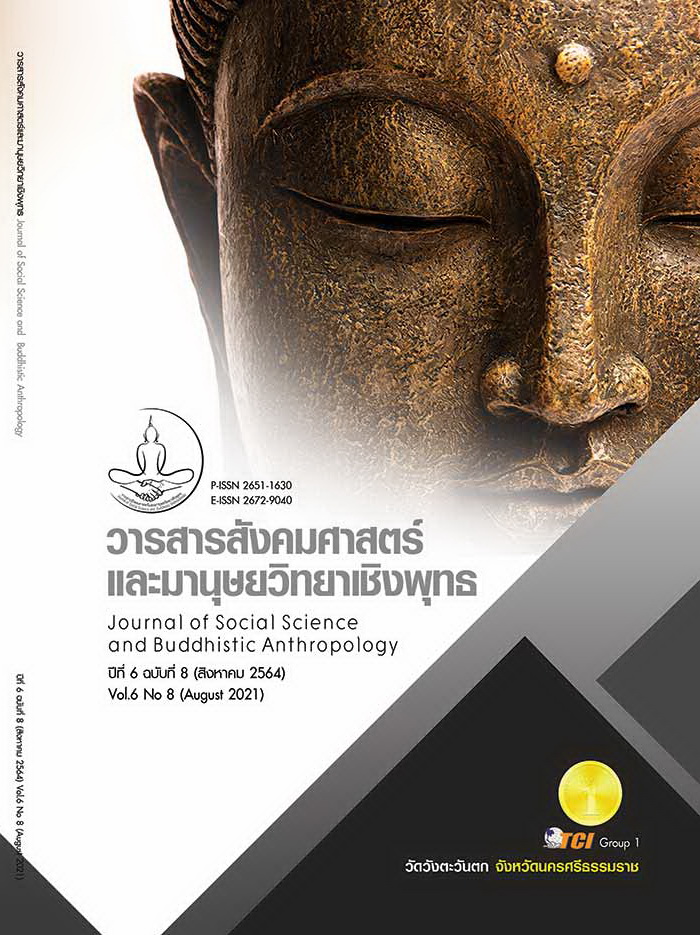DEVELOPING THE EFFECTIVENESS OF JOB PERFORMANCE DEVELOPMENT PROGRAM FOR VOCATIONAL EDUCATION TEACHERS
Keywords:
Job Performance, Vocational Education Teachers, Collective EfficacyAbstract
The objectives of this research article was to developing the effectiveness of job performance development program for vocational education teachers. The subjects consisted of 30 teachers, 15 teachers in the experimental group and 15 teachers in control group. Each group will take pretest - posttest - follow up. The experimental group received the treatment program, while the control group did not. Instruments used in this study included the job performance development program for vocational education teachers, a scale on self - job performance and on perceptions of coworker - job performance. Independent sample t - test and One - Way Repeated Measures (ANOVA) was utilized for the data analysis. Findings were as follows: 1) posttest and follow up scores of self - job performance and perceptions of coworker - job performance of the experimental group were significantly higher than those of the control group, and 2) posttest and follow up scores of self - job performance and perceptions of coworker - job performance of the experimental group were higher than the pretest scores at .001 level of significance. It implied that the treatment program was effective. From the findings, it was assumed that the treatment program was effective which helped to improve job performance. Therefore, it is beneficial for the development of vocational education teachers potential and extends the results to the development of vocational students as well.
References
กมลวรรณ เชาว์ช่างเหล็ก. (2557). การพัฒนาหลักสูตรฝึกอบรมระบบบริหารคุณภาพทั่วทั้งองค์กรในการสอนของสถานศึกษาอาชีวศึกษา. ใน วิทยานิพนธ์ปรัชญาดุษฎีบัณฑิต สาขาบริหารอาชีวะและเทคนิคศึกษา. มหาวิทยาลัยเทคโนโลยีพระจอมเกล้าพระนครเหนือ.
กัณติภณ คูสมิทธิ์. (2560). ก.แรงงาน แนะเรียนอาชีวะ ตลาดแรงงานต้องการสูง. เรียกใช้เมื่อ 4 กุมภาพันธ์ 2561 จาก http://www.mol.go.th/content/60084/1496366121
จันทร์เพ็ญ กลับดี และมณฑป ไชยชิต. (2558). อิทธิพลของภาวะผู้นำร่วมและวัฒนธรรมโรงเรียนแบบร่วมคิดร่วมทำที่ส่งผลต่อผลการปฏิบัติงานของครูในสถานศึกษาขั้นพื้นฐานในเขตตรวจราชการที่ 2. วารสารวิชาการมหาวิทยาลัยธนบุรี, 9(19), 108-115.
ปริทรรศน์ พนัธุบรรยงก์. (2545). TQM ภาคปฏิบัติ: เทคนิคการแก้ปัญหาแบบ “สึยาม่า”. กรุงเทพมหานคร: สมาคมส่งเสริมเทคโนโลยี (ไทย - ญี่ปุ่น).
ผ่องพรรณ ตรัยมงคลกูล และสุภาพ ฉัตราภรณ์. (2553). การออกแบบการวิจัย. (พิมพ์ครั้งที่ 6). กรุงเทพมหานคร: สำนักพิมพ์มหาวิทยาลัยเกษตรศาสตร์.
ผู้จัดการออนไลน์. (4 กุมภาพันธ์ 2558). สอศ. สนองยุทธศาสตร์บิ๊กตู่ พลิกโฉมอาชีวะเทียบชั้นสิงคโปร์. เข้าถึงได้จาก https://mgronline.com/specialscoop/detail/9580000036112
พรสวรรค์ ศิริวัฒน์. (2552). การพัฒนาครูด้านการจัดการเรียนรู้ที่เน้นกระบวนการคิดโดยใช้หลักการบริหารวงจร PDCA โรงเรียนบ้านโชคนาสาม อำเภอปราสาท สำนักงานเขตพื้นที่การศึกษาสุรินทร์ เขต 3. ใน วิทยานิพนธ์ครุศาสตรมหาบัณฑิต สาขาการบริหารการศึกษา. มหาวิทยาลัยราชภัฏสุรินทร์.
วิทยาลัยเทคนิคกันทรารมย์. (2561). แบบประเมินประสิทธิภาพและประสิทธิผลการปฏิบัติงานของข้าราชการครู. เรียกใช้เมื่อ 16 พฤษภาคม 2561 จาก http://www.krtc.ac.th/html/images/stories/19036101.pdf
ศูนย์เทคโนโลยีสารสนเทศและกำลังคนอาชีวศึกษา. (2564). รายงานสรุปจำนวนบุคลากรของสำนักงานคณะกรรมการการอาชีวศึกษา เพื่อประกอบการจัดสรรงบประมาณประจำปี 2562 งวด 3. เรียกใช้เมื่อ 12 เมษายน 2564 จาก http://techno.vec.go.th/ประชาสัมพันธ์/รายละเอียดข่าว/tabid/766/ArticleId/24893/language/th-TH/24893.aspx
สุริยา ฆ้องเสนาะ. (2558). อาชีวะก้าวไกล ไทยก้าวหน้า. เรียกใช้เมื่อ 4 กุมภาพันธ์ 2561 จาก https://library2.parliament.go.th/ebook/content-issue/2558/hi2558-037.pdf
Akiri, A. A. & Ugborugbo, N. M. (2009). Teachers’ effectiveness and students’ academic performance in Public Secondary Schools in Delta State, Nigeria. Stud Home Comm Sci, 3(2), 107-113.
Bandura, A. (1997). Self - Efficacy: The Exercise of Control. New York: W. H. Freeman and company.
Deming, W. E. (2004). Out of the Crisis. U.S.A.: MIT center for Advanced Engineering Study.
Janet, B. et al. (2009). Career development, collective efficacy, and individual task performance. Career Development International, 14(6), 534-546.
Katz - Navon, T. & Erez, M. (2005). When Collective - and Self - Efficacy Affect Team Performance The Role of Task Interdependence. Small Group Research, 36(4), 437-465.
Klassen, R. M. & Krawchuk, L. L. (2009). Collective motivation beliefs of early adolescents working in small groups. Journal of School Psychology, 47(1), 101-120.









